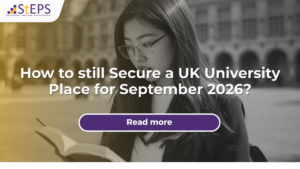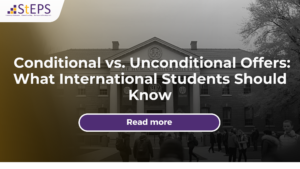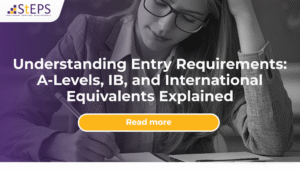For international students applying to UK universities, the personal statement is a critical part of the UCAS application. It’s your opportunity to present your motivations, experiences, and suitability for your chosen course in your own words. Yet, many applicants fall into common traps that can weaken their application. Below is an in-depth guide to the most frequent mistakes—and how to avoid them effectively.
1. Starting with Clichés or Generic Phrases
Mistake: Opening with overused phrases like “From a young age…” or “I’ve always been passionate about…”
Why it matters: These openings lack originality and fail to capture the reader’s attention. Admissions tutors read thousands of statements and are looking for something distinctive.
How to avoid it:
- Begin with a specific anecdote, experience, or insight that sparked your interest in the subject.
- Avoid famous quotes or vague generalities. Instead, show your enthusiasm through personal reflection and concrete examples.
2. Ignoring UCAS Guidelines
Mistake: Exceeding the 4,000 character limit.
Why it matters: UCAS guidelines are strict. Exceeding limits can result in a truncated or rejected submission.
How to avoid it:
- Plan your statement carefully and use concise language.
- Structure your writing with clear paragraphs and logical progression.
- Use the UCAS personal statement worksheet to brainstorm and organize ideas.
3. Lack of Clear Structure
Mistake: Writing a block of text without logical flow or signposting.
Why it matters: Admissions tutors need to follow your reasoning easily. A disorganized statement can obscure your strengths.
How to avoid it:
- Divide your statement into an introduction, body, and conclusion.
- Use transitions to guide the reader through your motivations, experiences, and goals.
4. Failing to Tailor the Statement to the Course
Mistake: Writing a generic statement that could apply to any subject or university.
Why it matters: Universities want to see genuine interest in their specific course and institution.
How to avoid it:
- Reference course details and explain how your background aligns with the program’s focus.
- Avoid applying to vastly different subjects with the same statement.
5. Overemphasis on Academics
Mistake: Listing grades and qualifications already included elsewhere in the application.
Why it matters: The personal statement should offer new insights beyond your academic record.
How to avoid it:
- Focus on how your academic experiences have shaped your interests.
- Link them to extracurricular activities, personal growth, and future aspirations.
6. Failure to Reflect on Personal Experience
Mistake: Mentioning activities without explaining their impact or relevance.
Why it matters: Reflection shows maturity, self-awareness, and a deeper understanding of your journey.
How to avoid it:
- Describe what you learned from each experience and how it influenced your decision to pursue the course.
- Connect experiences to skills like leadership, resilience, or communication.
7. Poor Proofreading and Editing
Mistake: Submitting a statement with spelling, grammar, or punctuation errors.
Why it matters: Mistakes suggest carelessness and can undermine your credibility.
How to avoid it:
- Review your statement multiple times.
- Read it aloud to catch awkward phrasing.
- Ask a teacher or native speaker to proofread it thoroughly.
8. Relying on Clichés and Vague Language
Mistake: Using phrases like “I love helping people” without context or specificity.
Why it matters: Vague language fails to convey genuine passion or individuality.
How to avoid it:
- Be specific. Instead of saying you love animals, describe a meaningful experience volunteering at a veterinary clinic.
- Use concrete examples to illustrate your interests and values.
9. Not Explaining Why You Chose the UK
Mistake: Omitting your reasons for studying abroad.
Why it matters: Universities want to understand your motivations for choosing the UK over other destinations.
How to avoid it:
- Discuss the UK’s academic reputation, teaching style, or cultural appeal.
- Link these to your long-term goals and explain how UK education fits into your career path.
10. Procrastination
Mistake: Leaving the statement until the last minute.
Why it matters: Rushed writing leads to poor structure, uninspired content, and missed opportunities.
How to avoid it:
- Start early and draft multiple versions.
- Seek feedback from mentors and revise accordingly.
- Give yourself time to refine your ideas and polish your writing.
11. Ignoring Course Requirements
Mistake: Failing to align your statement with the academic and personal qualities the course demands.
Why it matters: Admissions tutors want to see how your background fits the course.
How to avoid it:
- Research each university’s entry criteria thoroughly.
- Address how your previous studies, work experience, or skills meet those expectations.
12. Writing Too Modestly—or Overhyping Achievements
Mistake: Either underselling your strengths or exaggerating accomplishments.
Why it matters: Both extremes can hurt credibility and authenticity.
How to avoid it:
- Be honest and confident.
- Use evidence to support your claims—don’t just say you’re a great leader, show how you led a project or initiative.
13. Plagiarising or Sharing Your Statement Online
Mistake: Copying content or posting your statement publicly.
Why it matters: UCAS uses similarity detection software. Any flagged content could jeopardize your application.
How to avoid it:
- Write your own original statement.
- Avoid sharing it online or with friends unless seeking trusted feedback.
14. Applying to Too Many or Too Few Universities
Mistake: Applying to just one or two universities can limit your options, while applying to too many can dilute the quality of each application.
Why it matters: A balanced strategy improves your chances and allows for tailored applications.
How to avoid it:
- Aim to apply to 4–5 universities.
- Choose a mix of aspirational, realistic, and safe options.
Final Thoughts
Your personal statement is more than a formality—it’s your voice in the admissions process. By avoiding these common mistakes and approaching your statement with clarity, authenticity, and strategic planning, you’ll present a compelling case for admission. If you are looking for expert support to craft a compelling personal statement or confidently navigate your university application, StEPS is here to guide you. With over 25 years of experience, our internationally qualified counselors offer personalized support through services like StEPS2Uni and StEPS2Success, helping students and professionals achieve academic and career success with confidence.

















